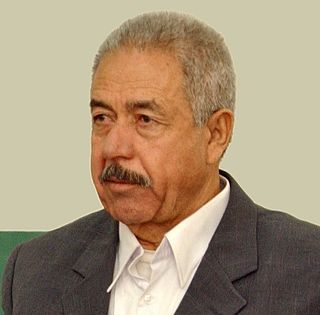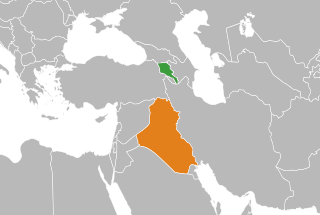Related Research Articles

Iraq under the Arab Socialist Ba'ath Party saw severe violations of human rights. Secret police, state terrorism, torture, mass murder, genocide, ethnic cleansing, rape, deportations, extrajudicial killings, forced disappearances, assassinations, chemical warfare, and the destruction of the Mesopotamian marshes were some of the methods Saddam Hussein and the country's Ba'athist government used to maintain control. Saddam committed crimes of aggression during the Iran–Iraq War and the Gulf War, which violated the Charter of the United Nations. The total number of deaths and disappearances related to repression during this period is unknown, but is estimated to be at least 250,000 to 290,000 according to Human Rights Watch, with the great majority of those occurring as a result of the Anfal genocide in 1988 and the suppression of the uprisings in Iraq in 1991. Human Rights Watch and Amnesty International issued regular reports of widespread imprisonment and torture.

Ali Hassan Majid al-Tikriti, nicknamed Chemical Ali, was an Iraqi politician and military commander under Saddam Hussein who served as defence minister, interior minister, and chief of the Iraqi Intelligence Service. He was also the governor of Kuwait during much of the 1990–91 Gulf War.

Halabja is a city in the Kurdistan Region of Iraq and the capital of Halabja Governorate, located about 240 km (150 mi) northeast of Baghdad and 14 km (9 mi) from the Iranian border.

The Anfal campaign was a counterinsurgency operation which was carried out by Ba'athist Iraq from February to September 1988 during the Iraqi–Kurdish conflict at the end of the Iran–Iraq War. The campaign targeted rural Kurds because its purpose was to eliminate Kurdish rebel groups and Arabize strategic parts of the Kirkuk Governorate. The Iraqis committed atrocities on the local Kurdish population, mostly civilians.

The Badr Organization, previously known as the Badr Brigades or Badr Corps, is an Iraqi Shia Islamist political party and paramilitary organization headed by Hadi Al-Amiri. The Badr Brigade, formed in 1982 and led by Iranian officers, served as the military arm of the Supreme Council for Islamic Revolution in Iraq (SCIRI), a Shia Islamic party based in Iran. The Badr Brigade was created by Iranian intelligence and Shia cleric Mohammad Baqir al-Hakim with the aim of fighting Saddam Hussein's regime during the Iran–Iraq War. Since the 2003 US-led invasion of Iraq most of the Badr Brigades' fighters have entered the new Iraqi army and police force. Politically, Badr Brigade and SCIRI were considered to be one party since 2003, but have now unofficially separated with the Badr Organization now an official Iraqi political party. Badr Brigade forces, and their Iranian commanders, have come to prominence in 2014 fighting the Islamic State of Iraq and the Levant (ISIL) in Iraq. It is a part of the Popular Mobilization Forces.

Iraqi Assyrians are an ethnic and linguistic minority group, indigenous to Upper Mesopotamia. Assyrians in Iraq are those Assyrians still residing in the country of Iraq, and those in the Assyrian diaspora who are of Iraqi-Assyrian heritage. They share a common history and ethnic identity, rooted in shared linguistic, cultural and religious traditions, with Assyrians in Iran, Assyrians in Turkey and Assyrians in Syria, as well as with the Assyrian diaspora. Assyrian diaspora in Detroit, Areas with large expat populations include Chicago and Sydney.

Kurdistan Region is an autonomous administrative entity within the Republic of Iraq. It comprises four Kurdish-majority divisions of Arab-majority Iraq: the Erbil Governorate, the Sulaymaniyah Governorate, the Duhok Governorate, and Halabja Governorate. The KRI is bordered by Iran to the east, by Turkey to the north, and by Syria to the west. It does not govern all of Iraqi Kurdistan, and lays claim to the disputed territories of northern Iraq; these territories have a predominantly non-Arab population and were subject to the Ba'athist Arabization campaigns throughout the late 20th century. Though the KRI's autonomy was realized in 1992, one year after Iraq's defeat in the Gulf War, these northern territories remain contested between the Kurdistan Regional Government and the Government of Iraq to the present day. In light of the dispute, the KRI's constitution declares the city of Kirkuk as the capital of Iraqi Kurdistan. However, the KRI does not control Kirkuk, and the Kurdistan Region Parliament is based in Erbil. In 2014, when the Syria-based Islamic State began their Northern Iraq offensive and invaded the country, the Iraqi Armed Forces retreated from most of the disputed territories. The KRI's Peshmerga then entered and took control of them for the duration of the War in Iraq (2013–2017). In October 2017, following the defeat of the Islamic State, the Iraqi Armed Forces attacked the Peshmerga and reasserted control over the disputed territories.
Minorities in Iraq include various ethnic and religious groups.

Iraqi Armenians are Iraqi citizens and residents of Armenian ethnicity. Many Armenians settled in Iraq after fleeing the 1915 Armenian genocide. It is estimated that there are 10,000–20,000 Armenians living in Iraq, with communities in Baghdad, Mosul, Basra, Kirkuk, Baqubah, Dohuk, Zakho and Avzrog.

The 1991 Iraqi uprisings were ethnic and religious uprisings against Saddam Hussein's regime in Iraq that were led by Shi'ites and Kurds. The uprisings lasted from March to April 1991 after a ceasefire following the end of the Gulf War. The mostly uncoordinated insurgency was fueled by the perception that Iraqi President Saddam Hussein had become vulnerable to regime change. This perception of weakness was largely the result of the outcome of the Iran–Iraq War and the Gulf War, both of which occurred within a single decade and devastated the population and economy of Iraq.

Refugees of Iraq are Iraqi nationals who have fled Iraq due to war or persecution. In 1980- 2017, large number of refugees fled Iraq, peaking with the Iraq War and continuing until the end of the War in Iraq (2013–2017). Precipitated by a series of conflicts including the Kurdish rebellions during the Iran–Iraq War, Iraq's Invasion of Kuwait (1990) and the Gulf War (1991), the subsequent sanctions against Iraq (1991–2003), culminating in the Iraq War and the subsequent War in Iraq (2013–2017), millions were forced by insecurity to flee their homes in Iraq. Iraqi refugees established themselves in urban areas in other countries rather than refugee camps.

The Christians of Iraq are considered to be one of the oldest continuous Christian communities in the world.

Kurds in the United States refers to people born in or residing in the United States of Kurdish origin or those considered to be ethnic Kurds.

The Iraqi–Kurdish conflict consists of a series of wars, rebellions and disputes by the Kurds against the central authority of Iraq starting in the 20th century shortly after the defeat of the Ottoman Empire in World War I. Some put the marking point of the conflict beginning to the attempt by Mahmud Barzanji to establish an independent Kingdom of Kurdistan, while others relate to the conflict as only the post-1961 insurrection by the Barzanis. Since the US-led invasion of Iraq and the subsequent recognition of the Kurdistan Region (KRI) in the new Iraqi constitution, the number and scope of armed clashes between the central government of Iraq and the Kurds have significantly decreased. In spite of that, however, there are still outstanding issues that continue to cause strife such as the disputed territories of northern Iraq and rights to oil and gas, leading to occasional armed clashes. In September 2023, Masrour Barzani sent a letter to the President of the United States expressing concerns about a possible collapse of the Kurdistan Region and calling for the United States to intervene.
The problem of Kurdish refugees and displaced people arose in the 20th century in the Middle East, and continues today. The Kurds, are an ethnic group in Western Asia, mostly inhabiting a region known as Kurdistan, which includes adjacent parts of Iran, Iraq, Syria, and Turkey.

Between 1968 and 2003, the ruling Arab Socialist Ba'ath Party of the Iraqi Republic perpetrated multiple campaigns of demographic engineering against the country's non-Arabs. While Arabs constitute the majority of Iraq's population as a whole, they are not the majority in parts of northern Iraq, and a minority in Iraqi Kurdistan. In an attempt to Arabize the north, the Iraqi government pursued a policy of ethnic cleansing, killing and forcefully displacing a large number of Iraqi minorities—predominantly Kurds, but also Turkmen, Yazidis, Assyrians, Shabaks, Mandaeans, and Armenians, among others—and subsequently allotting the cleared land to Arab settlers. In 1978 and 1979 alone, 600 Kurdish villages were burned down and around 200,000 Kurds were deported to other parts of Iraq.

Feylis, also known as Feyli Kurds, is a Kurdish tribe mainly from Baghdad and the borderlands between Iraq and Iran. They speak Feyli which is classified as a sub-dialect of Southern Kurdish, but is commonly mistaken as being identical with the separate Feyli dialect of Northern Luri. Linguist Ismaïl Kamandâr Fattah argues that the Kurdish Feyli dialect and other Southern Kurdish sub-dialects are 'interrelated and largely mutually intelligible.'

Nugra Salman , also known as Nugrat al-Salman or Nigrat Salman is a former prison facility near the village Salman in the desert of the Muthanna Governorate in Iraq. It has been constructed in 1930 during the Hashemite Monarchy and later also by the Governments of Abd al-Karim Qasim and Saddam Hussein.
Mandali is one of the disputed areas between Baghdad and Erbil and belongs to Diyala Governorate administratively. It is 93km away from the city of Baqubah, the center of Diyala Governorate. It is inhabited by a mixture of Arabs, Kurds and Turkmen.
References
- ↑ "From Crisis to Catastrophe: the situation of minorities in Iraq" (PDF): 5. Retrieved 23 May 2017.
{{cite journal}}: Cite journal requires|journal=(help) - ↑ "Iraqi Kurds Seek Recognition of Genocide by Saddam". Al-Monitor (in Hebrew). 8 March 2013. Retrieved 23 May 2017.
- ↑ "جريمة إبادة الكرد الفيليين … والصمت الحكومي والتجاهل الرسمي عن إستذكار هذه الفاجعة الآليمة ! !" (in Arabic). 25 April 2010. Retrieved 23 May 2017.
- ↑ "Faili kurds". 6 November 2017.
- ↑ "Scars that won't heal: Iraq recognises Fayli Kurd persecution as 'genocide'". ekurd.net. Retrieved 23 May 2017.
- ↑ Marsh, Robin. "International Recognition of the Kurdish Genocide - Concerning the Faili Kurds". www.uk.upf.org. Retrieved 23 May 2017.
- ↑ "GENOCIDE AGAINST THE KURDS IN IRAQ: IRAQ AND INTERNATIONAL RECOGNITION OVER TIME". uk.gov.krd. Retrieved 23 May 2017.
- ↑ Jaffar Al-Faylee, Zaki (2010). Tareekh Al-Kurd Al-Faylyoon. Beirut. pp. 485, 499–501.
{{cite book}}: CS1 maint: location missing publisher (link) - ↑ Al-Hakeem, Dr. Sahib (2003). Untold stories of more than 4000 women raped killed and tortured in Iraq, the country of mass graves. pp. 489–492.
- ↑ Taneja, Preti. "Assimilation, Exodus, Eradication: Iraq's minority communities since 2003" (PDF): 15.
{{cite journal}}: Cite journal requires|journal=(help) - ↑ "33-Year Post Faili Kurds Genocide". ekurd.net. Retrieved 23 May 2017.
- ↑ "The Faili Kurds of Iraq: Thirty Years Without Nationality". ReliefWeb. 2 April 2010. Retrieved 23 May 2017.
- ↑ "Faili kurds". 6 November 2017.